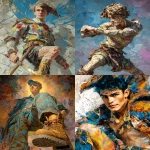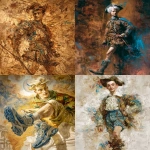Explore the Best AI Image Gallery

Harnessing AI Images in Marketing: A New Era of Creativity and Ethics
The advent of artificial intelligence (AI) has opened new horizons in various domains, with marketing being one of the most targeted areas for innovation. One of the most compelling aspects of AI technology is its capability to generate stunning and highly personalized images at scale. From e-commerce to brand campaigns, AI-generated imagery is transforming how businesses communicate and attract audiences.
Impact on the Creative Industry
AI in marketing not only enhances visual appeal but fundamentally alters the creative industry. Traditional roles of graphic designers and photographers are evolving due to AI tools, such as Adobe Sensei and Canva. These platforms allow users to create appealing visuals without extensive training. Consequently, marketers can rapidly produce images that align with campaign objectives, reducing reliance on human resources.
Potential Uses of AI-Generated Images
The versatility of AI-generated images extends across several marketing channels. Here are some notable uses:
- E-commerce: AI images facilitate the creation of product visuals that are both engaging and realistic, enhancing online shopping experiences.
- Social Media: Consistent and high-quality content is key for social media marketing. AI can generate unique visuals tailored to specific platforms.
- Advertising: AI-generated images can be A/B tested to determine which visuals resonate better with target audiences.
- Personalization: Data analysis allows AI to create customized images for specific demographics, enhancing customer engagement.
Ethical Considerations
While AI-generated images offer substantial advantages, they come with important ethical considerations:
- Originality and Copyright: As AI tools generate images using existing data, questions arise about ownership and originality. Who owns an AI-generated image? This remains a gray area in copyright law.
- Authenticity: AI-generated images can blur the line between real and artificial visual content. Misleading representations can undermine trust, especially in advertising.
- Bias in AI: AI algorithms may reflect the biases present in their training data, leading to stereotypes or unrepresentative images that perpetuate social biases.
Future Trends
Looking ahead, the evolution of AI in marketing will likely see the following trends:
- Real-Time Adaptation: Future AI systems could adapt images in real-time based on consumer interactions, thus optimizing engagement dynamically.
- Augmented Reality (AR) Integration: As AR technology evolves, combining AI-generated images with AR can create immersive shopping experiences.
- Emphasis on Ethics: With increased scrutiny on ethical usage, businesses may adopt transparent practices regarding AI-generated content.
- Collaboration between Humans and AI: Instead of replacing human creativity, AI tools will likely augment and enhance the skill sets of marketers and designers.
Conclusion
AI-generated images represent a significant leap forward in marketing creativity, providing businesses with tools to enhance branding and customer engagement while redefining traditional roles within the creative industry. However, as companies embrace these innovative technologies, they must also navigate ethical challenges to ensure responsible use. The future of AI in marketing holds promising developments, and understanding both its potential and pitfalls will be crucial for leveraging this extraordinary tool effectively.




](https://images.ai-img.art/thumbnails/150/8c3bd422d50d35735d8fb33bd314a79e30e5b150129d5d09bdad822a2007593f.webp)

](https://images.ai-img.art/thumbnails/150/1614d64dd7156c95db952258978be809eb3db8cea4453fec69c49cbdfe63fa94.webp)


](https://images.ai-img.art/thumbnails/150/3a60737a5b67fa252207ad1ae6db245a26284f53fb5846996bb34515b39ff269.webp)


